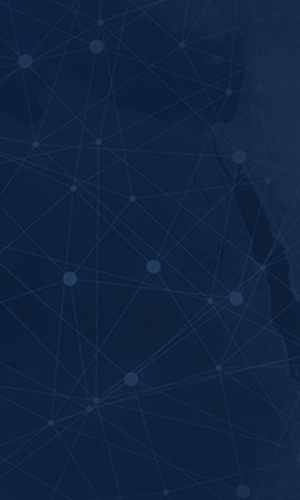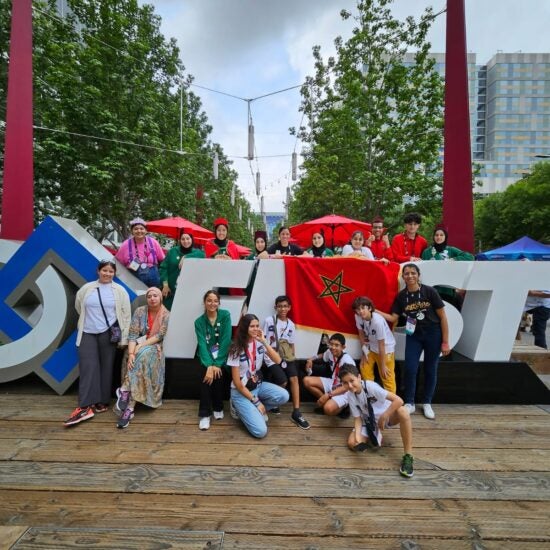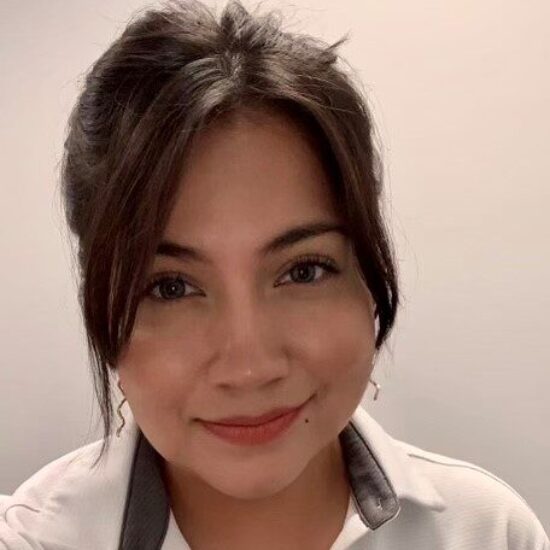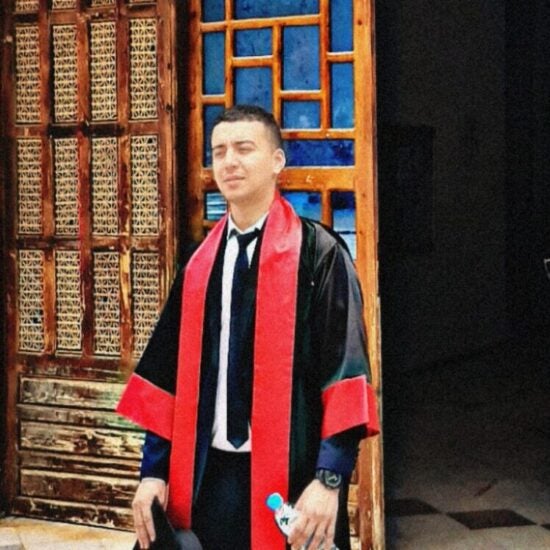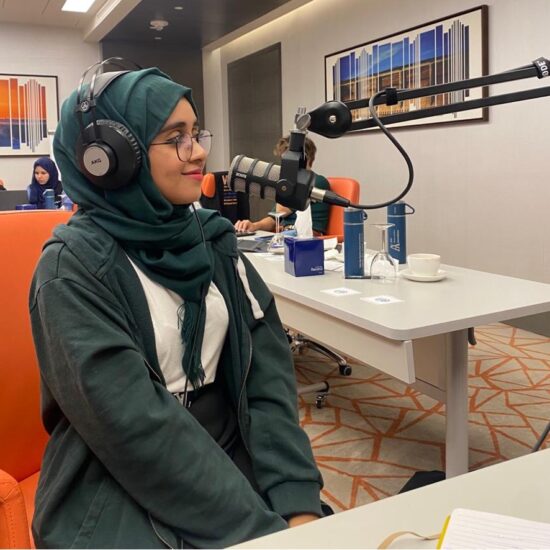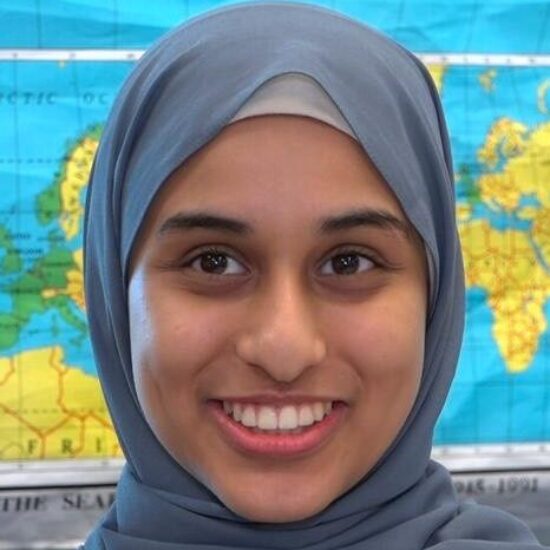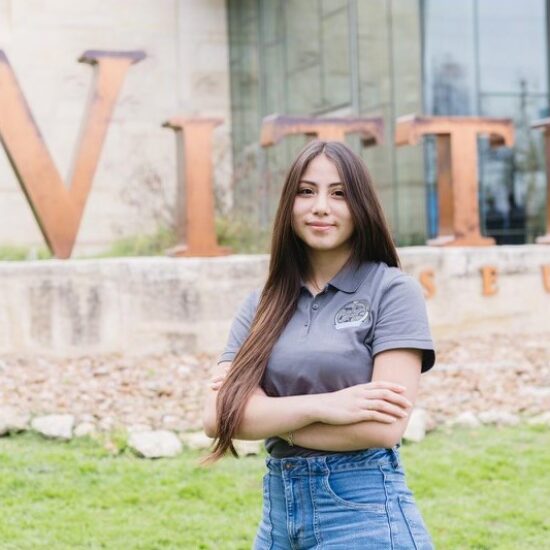In Yemen, high school student Hesham has adjusted to life in a new city. Having grown up rural, Hesham and his family moved to a big city because of the ongoing civil war. Although it has been difficult for Hesham, moving has exposed him to new opportunities. It was during this transition that he first heard of The Experiment Digital.
Designed to connect hundreds of young people across the United States with peers in Iraq, Algeria, and Yemen, The Experiment Digital prepares participants to be more civically engaged and lead change. For eight weeks over the summer, participants take part in this online cultural exchange to practice digital etiquette, collaborative problem solving, and intercultural communication skills. Developing these skills together allows participants to form friendships with a more personal understanding of each other’s cultures and identities. At the conclusion of the program, participants utilize their gained knowledge and skillset to design and implement service projects in their local communities.
“When I read the word ‘congratulations’, I couldn’t feel my feet! I cannot describe that moment when I received that [acceptance] email from The Experiment Digital.” To Hesham, The Experiment Digital represented a unique experience to learn about new cultures and to improve his English skills.
Thousands of miles away in San Diego, CA, Sofia was also preparing for her summer with The Experiment Digital. Like Hesham, Sofia respectively knew little about the Middle East and North Africa region since it was not covered in her formal education. To her, The Experiment Digital was an opportunity to learn how to communicate with peers in the Middle East and discover new cultures, something she hadn’t had the opportunity to do before.
What these two young people have in common is a desire to step outside of their comfort zones and learn from people who are different than them. Through interactions with international peers, Hesham and Sofia were able to do just that. “I had learned things unlike anything I had learned about before,” Sofia said while she described learning about different recycling practices in Algeria, Iraq, and Yemen compared to her hometown of San Diego. Within this digital space, young people can ask questions and learn directly from their peers who live and experience different issues in their communities.
Over the course of the program, participants engaged in experiential learning, an education approach that engages students in activities and encourages them to reflect on and interpret their observations from those experiences. This learning takes place in “neighborhoods”, or groups of 25 participants, led by trained facilitators who are program alumni with experience in cultural exchanges. Both Sofia and Hesham were a part of facilitator Haneen’s neighborhood, an Iraqi university student studying in Jordan who positively impacted their experiences. “Han has the leadership skills to get your attention on the activities. She’s wonderful and makes everything very easy,” Hesham said.
In addition to larger group discussions, participants also engage in safe and intimate small group spaces where they share their hopes, fears, and discuss gender norms and stereotypes. Reflecting on her summer, Sofia’s favorite activity was being able to connect in her small group of 5 participants, known as a “family”, in bi-weekly video calls. Before the exchange, Sofia shared that she “was less open to talking to new people and found difficulty in starting conversations with others.”. Both Hesham and Sofia found these conversations to be a special opportunity to better know the perspectives of their peers. Sofia described this experience by saying, “even if we had different opinions, we could speak without judgement.” Hesham added, “before, it was really hard to communicate with others. I needed my idea to be the right idea, but now I think that even if others may like or dislike my idea, they can still add to it. A part of leadership is sharing your ideas and working with others.”
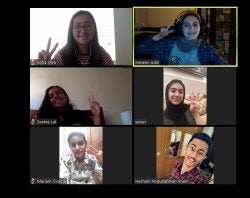
Hesham and Sofia in a video call with their family.
Reflecting on their virtual exchange, Sofia and Hesham discovered how their views of the world had broadened. Before the exchange, Hesham questioned, “Is Yemen alone in these issues? Or are other countries also facing similar issues?” By identifying issues that they care about in their communities and sharing them with their peers, Hesham discovered that youth around the world face similar challenges and that they can work together to solve them.
Through The Experiment Digital, Sofia and Hesham were exposed to new cultures and ideas, while improving their own leadership and cross-cultural communication skills. “I’m more open about the causes I’m passionate about and more aware of issues in the Middle East and North Africa region,” Sofia said while describing her newfound ability and desire to discuss complex global issues with others. For Sofia, her virtual exchange experience has empowered her to tackle the issue of homelessness in her community by developing SMART goals and using learned project planning skills. Hesham now sees himself as an activist in his community and recognizes the importance of exploring multiple perspectives when approaching an issue. With his newfound communication skills, Hesham is leading a team of alumni in Yemen to help women create their own businesses by teaching them how to sew. After completing The Experiment Digital, both Sofia and Hesham feel more passionate about creating positive social change in their communities and want to take this experience into careers that help others, whether through law or international relations.
The Experiment Digital is implemented by World Learning and is supported by the J. Christopher Stevens Virtual Exchange Initiative (JCSVEI). JCSVEI is a U.S. Department of State’s Bureau of Educational and Cultural Affairs program administered by the Aspen Institute.

